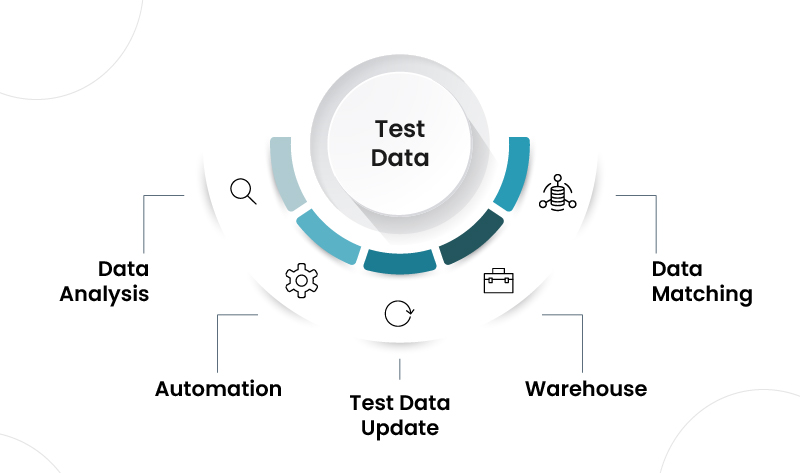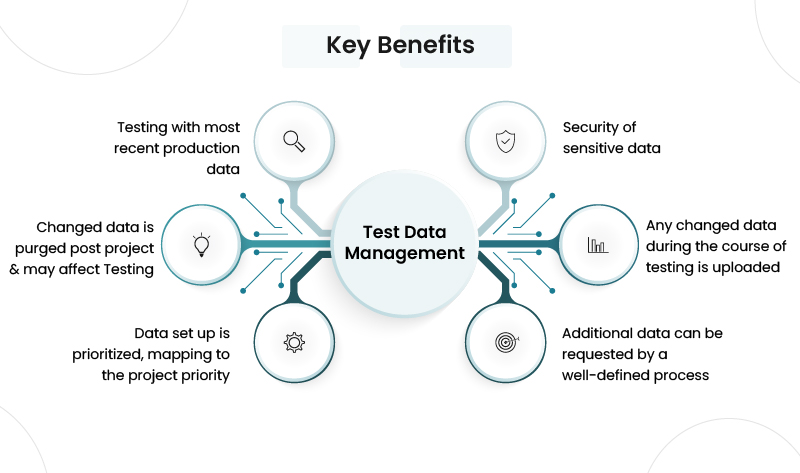Whether you're a Fortune 500 corporation or a small mom-and-pop shop, accurate data collection and management is vital to keeping things running smoothly. Informed decision making comes from clean data, especially in fields like software testing.
In the world of agile software development and testing, data has traditionally been a messy business. In order to make sure that test data is usable for making informed business decisions, it's important to have a system in place for managing it.
This is where a test data management system comes into play.
Opkey's TDM solution streamlines test data generation, availability, and automation. It helps maintain accurate and up-to-date test data while facilitating easy change tracking and rollback. In this article, we'll discuss what test data management is and why it's so important. We'll also provide some tips on how to get started with test data management.
Let's jump in.
See how Opkey handles test data management: Schedule a demo now!
What is test data management?
Test data management (TDM) is the practice of managing and organizing the test data used in software testing.
Test data management is an essential part of quality assurance, since it ensures that the data used in the development and testing teams is accurate and reliable. This, in turn, helps reduce the number of software defects and ensure that the software meets end-user requirements.
Why is test data management important?
In the realm of software development, the significance of test data management cannot be overstated. It serves as the bedrock upon which reliable, efficient, and secure testing processes are built.
Ensures Data Accuracy
Accurate testing requires accurate data. Test data management ensures that the data used for testing is precise, reducing the risk of faulty results and costly errors in production.
Enhances Test Coverage
Comprehensive testing is essential to identify potential issues. Effective test data management broadens test coverage by providing a diverse set of data scenarios, increasing the likelihood of detecting defects.
Protects Sensitive Information
Safeguarding sensitive customer data is paramount. Test data management solutions employ data masking and encryption techniques to shield sensitive information, ensuring compliance with data protection regulations.
Optimizes Resource Utilization
Efficient resource allocation is critical. By providing the right data at the right time, test data management reduces resource wastage and accelerates the testing process.
Facilitates Automation
Automation is a cornerstone of modern software testing. Test data management streamlines data provisioning for automated test cases, improving efficiency and repeatability.
Supports Agile and DevOps
Agile and DevOps methodologies demand rapid testing cycles. Test data management aligns with these approaches, enabling quick and continuous testing.
Reduces Costs and Effort
Efficient test data management minimizes costs associated with data provisioning, data replication, and debugging, ultimately saving valuable resources.
Ensures Compliance
Compliance with industry regulations is non-negotiable. Test data management solutions assist in meeting compliance requirements by managing data privacy and security effectively.

There are three main types of test data management
Control Data
This is the main data set against which test data, test coverage and all other data sets is compared. It's used to make test datasets and verify the accuracy of the test results.
Control data takes center stage as the cornerstone dataset against which all other data sets are compared. It is instrumental in crafting test datasets and meticulously validating the accuracy of test results.
Control data serves as the blueprint for creating precise test datasets, ensuring that the data used for testing faithfully represents real-world scenarios. In essence, control data is the lynchpin that fosters precision, thoroughness, and trust in the testing process.
Reference Data
This is data that is used to test specific functions or features of the software.
In the intricate world of software testing, reference data plays a pivotal role by providing the precision required for testing specific functions or features. It serves as the bedrock upon which targeted tests are built, ensuring that every aspect of the software's functionality is rigorously examined.
By leveraging reference data, organizations can validate that their software not only meets expected standards but also excels in delivering seamless and accurate user experiences.
Test Data
This is the actual synthetic data generation that is used in testing.
At the core of software validation lies test data, the tangible representation of real-world scenarios. Derived from control or reference data, or meticulously created for the testing process, test data is the lifeblood of testing endeavors.
It breathes life into test cases, ensuring that software functionality aligns seamlessly with user expectations, and it is the litmus test for software reliability, robustness, and excellence.

Benefits of test data management
When it comes to test data, you can never be too careful. Test data management is essential to ensuring the quality, accuracy and reliability of your test data.

By taking the time to properly manage your test data sources, you'll enjoy more optimal test coverage, reduced costs as a result of early bug-detection, and peace of mind knowing that your test data management processes are compliant and secure.
But what does that actually mean? Let's break it down.
Data provisioned per testing type
Good test data management is all about provisioning the right data for the right tests. For instance, you don't want to use production data for your unit tests because that could lead to inaccurate results.
And you don't want to use sample data for your performance tests, because that less realistic data won't give you an accurate picture of how the system will perform under real-world conditions.
Better compliance and security
TDM ensures compliance and security. All of your sensitive data should be properly encrypted and hidden away from prying eyes.
Why Utilize TDM for Sensitive Data?
Test data management is a practice adopted by organizations that extensively process sensitive data and need to ensure full operability. This significance becomes especially pronounced in industries like healthcare, where any compromise of sensitive customer data could result in severe repercussions.
Reusability of test data sets
TDM promotes reusability, fostering a culture of efficiency where teams can harness the power of historical test data to validate software changes and enhancements quickly and with confidence. Once you've created a set of accurate and reliable test data, you should make sure to store it in a safe place so that you can use it again and again.
Avoiding redundancy in data
Multiple teams within a project may create copies of the same production data for their use. Due to this, redundant copies of the same production data are made and storage space is wasted. Because all teams use the same repository when a TDM tool is used, the storage capacity can be optimized.
Better performing applications
The main benefit of TDM is high-quality data for automated tests. High quality, trusted test data also enables the early discovery of bugs during the testing phase. The end result of high quality test data is a high-quality, stable application with few production flaws.
In an Agile world, requirements and features are constantly changing, which means your test data has to change with it.
But if you don't have a TDM strategy in place, it can be hard to keep track of all the different versions of test data you need, and even harder to make sure that the right amount of data provisioning of test data is being used for the right tests. This can lead to a lot of wasted time and effort, not to mention frustration on the part of your team.
A good test data management strategy can help you avoid all of this by giving you a way to manage your test data more efficiently.
And that's why TDM is so important to not just creating test data, but managing it effectively so that you can get the most out of your testing efforts.
Read the report: The State of ERP Testing
Steps for test data management
Now that you know the basics of TDM, here are four steps to get you started on your test data management journey.
Figure out what data you need
The first step is to determine which data is needed for testing. This will vary depending on the project, so it's important to take some time to figure out exactly what data is required.
Create or obtain the test data
Once you know what amount of synthetic test data is needed, the next step is to create or obtain the actual test data.
This can be done in a number of ways, such as generating synthetic data from test data warehouses, using real data from production systems (with proper security and data privacy regulations and controls in place), or using a combination of both.
Prepare the test data
After the test data has been created or the appropriate test data provisioning platform obtained, it needs to be prepared for use.
This includes things like masking data, ensuring that the data is complete, accurate, and consistent, and making sure it is formatted correctly for use in the testing environment.
Use and manage the test data
The final step is to actually use the test data in the testing process. This includes things like: generating test data sets, setting up test data, provisioning up the test environment, running tests, and storing and managing the test data after the entire testing process is complete.
Main challenges in test data management
- Testing teams have inadequate or incomplete test data
- Testing teams don’t have access to data sources
- Testing teams get slow response from development teams, due to other priorities
- Large volumes of data may be needed, but QA teams don’t have the appropriate test data management tools or skill sets to manage so much data
- Testers often spend significant time and effort in communicating with architects, database admins, and business analysts to gather data, rather than focusing on actual testing
- The provided data is often sensitive, and thus unsuitable for testing purposes
- Huge volumes of data are needed to be analyzed in a short time-frame
The current state of test data management for automation testing
One of the biggest bottlenecks in test automation is the creation of test data.
Typically, test data is created through hours-long sessions with business users where they map out their process flows in large, complex Excel files.
The process to generate synthetic data is monotonous and time-consuming, and as such, realistic data is typically rife with human error. As we know, data like this is not optimal for test automation.
Opkey’s TDM solution for test automation
Opkey is one of the most renowned test data management tools. It leverages test mining technology to autonomously mine test data from the client’s environment and ensure it’s in the correct format.
Opkey also mines master data details such as multiple data sources such as Chart of Account, Employee, Customers, Item, Supplier, Procure to Pay, Order to Cash, and more, which can reduce QA teams’ data collection efforts by up to 40%.
Opkey’s test data management solution is highly effective in scenarios when QA teams need to execute multiple testing cycles during an EBS to Cloud migration, or in executing regression testing for Oracle’s quarterly updates.
In short, Opkey’s TDM solution saves companies time and money by ensuring their test data is always ready for Oracle testing.

Opkey's Test Data Management solution for test data management process, show data generation, test data availability and automation. TDM is important because it helps ensure that the data used for testing is accurate and up-to-date. It also helps to keep track of changes to the data so that it can be easily rolled back if necessary.
Additionally, test data management with the right test data management tools can help to automate the process of creating and maintaining test data. This can save time and resources. Opkey is launching one of the best test data management tools that would make TDM effortless.
FAQ



.png)


















